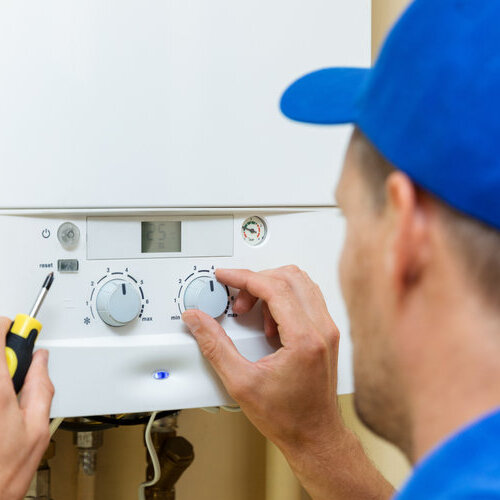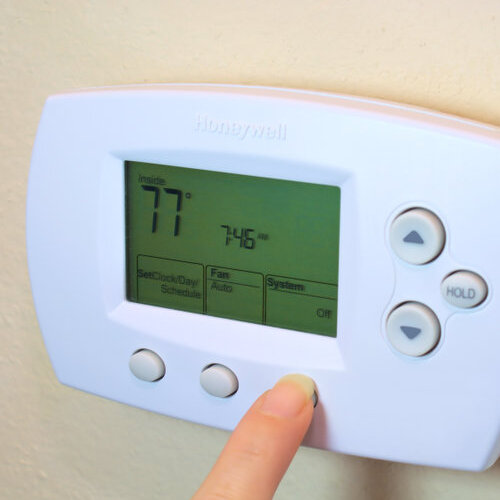
Time to Take Care of Your Heating
With the arrival of the cooler months, it is time to make sure any heating repairs are done, and your home is ready for the dropping temperatures. An annual heating system cleaning and inspection by a professional is always a good idea when it starts getting chilly. That way you aren’t surprised by a cold home in the middle of the night or after a hard days’ work.
If you’re not sure why your heating system is noisy or your heating system smells like burning, then you definitely need to call a professional heating service. They can inspect the issues you’re having and make any heating repair that is needed. Or, if they determine that there isn’t any heating repair available to get you fixed up, they can advise you on the replacement unit you need.
For now, let’s discuss those two common complaints homeowners have.
What is making my heating system noisy?
Most of a central heating system’s components are metal, and metal contracts and expands as it cools and heats. So, that noise you’re hearing doesn’t necessarily mean you need to call for heater repair. However, you don’t want to assume it is normal and ignore it either, especially if you’ve never heard a noise coming from it before. Here are a few things to check out when you have a noisy heater system:
- GURGLING: This is typical of a boiler-type heating system and is usually caused by the pipes or radiator having air trapped inside them. This is easily fixed by bleeding the air from the pipes, and there are many videos available online that will give you step-by-step instructions on doing this.
- NOISY PIPES: Common in colder weather are pipes freezing and not letting the water circulate. If it is the condensation pipe that is frozen, pour warm water (though not boiling) over it to help thaw it out. Once it thaws, restart the boiler.
- TAPPING NOISE: A tapping sound can be a limescale build-up in the pipes and radiator. A non-acidic cleaner will flush that limescale out while the system is turned off.
- HUMMING SOUND: A humming sound is often the heating element and the immersion not properly functioning. The first thing to do is check that the thermostat is working and then check the central heat pump. It may need the speed slowed down.
- KNOCKING SOUNDS: As the water heats up in the system and begins to flow through the pipes, the pipes will expand, and then as they cool down, they contract. If the room around the pipes isn’t sufficient, it will cause a knocking sound. You can check the pipes and move them as needed to make some room.
Why does my heating system smell like it’s burning?
This is a common complaint with the first cold snap of the season. Every heating system, whether it is an electric heater, a furnace, or a heat pump, will accumulate dust and assorted particles while dormant for the summer. When you first turn on your system, you’ll smell that dust and the particles burning off.
This should be short-lived though and over with after a few hours, or perhaps a day at the longest. If you’re still smelling a burning odor after that, call for heating repair service just to make sure it isn’t something worse. With a heating system annual service contract, these are things that are caught during the inspection and cleaning, eliminating this worry.
My heating system will not turn off – why?
There are three possible reasons why your heating system isn’t turning off. Follow these three suggestions and if it still won’t turn off, schedule a professional heating repair service:
- Thermostat: A thermostat can go bad without any warning and can often be repaired. However, if it is an older thermostat, it may be easier to replace it with a newer programmable unit. From a broken heating sensor or switch to faulty wiring, there are several possible issues with a thermostat that can keep a heater from turning off.
- Primary Controller: If the thermostat is working, check within the heating unit next. It may be the primary controller though, at this point, you should schedule professional heating repair service.
- Water System: For a home heater or radiator, the heat may not be turning off because of a problem with the water check valve. If this is defective, then water keeps circulating and the heat keeps heating. This heating repair is better done by a professional than a homeowner, but you can check for the issue yourself.
Can you repair heating elements?
Not usually, as replacement is the only heating repair possible when the element is the problem. If you have determined your heating isn’t working because of the heating element, call a heating repair service for an estimate. Questions to ask yourself so you can be prepared for that call include “What heating system do I have?” With that information, they can give you a rough estimate of the cost to replace the element.
How do you know when to replace a heating system?
- The Age of the Heating System- A heating system that is 15 to 20 years old is in the range where replacement is cheaper than most heating repairs.
- Energy Bills Increasing – Yes, our energy bills will increase every year. However, a heating system that isn’t running as efficiently as possible, even after heating repairs, should be replaced.
- Excessive Dirt, Dust, Rust, Soot – If you are noticing more dander, dirt, dust, rust, or soot in your home and around the heating system, and you’ve changed the air filter every 30 days, it is time to replace the system.
- Humidity Problems – Humidity is a common issue during the winter for everyone, especially in homes with wood flooring. If the air seems exceptionally dry, it may be that the heating system has reached its life expectancy. A heating repair service call for inspection and cleaning can confirm this for you.
- Uneven Heating – If the rooms within your home are not heating evenly, or maybe one or two aren’t heating at all, it is likely time for a new heating system. You can have the air ducts cleaned and inspected first, and that may fix the problem, even having a heating repair with cleaning and inspection first is worth the cost before getting a new system.
- Unusually Noisy – A heating system that is making louder than normal sounds or one that develops a buzz, hum, or rattle is probably experiencing a problem like internal cracks and leaks. Replacing the unit is the best thing to do in this situation.
- Visible Cracks and Rust – If you have noticed cracks or rust developing around or inside the heating system, it needs to be replaced sooner than later.
- Frequent Repairs – Are you having to get heating repairs every winter – perhaps two or three times a year? At this point, your heating repair technician should have already recommended a replacement. If they have, listen to them because this old unit is costing you more money than a new unit will at the end of the day.

At The End of the Day
Can a heating system make you sick? Yes, if not maintained and the air filter not changed out every 30 days or more, it can cause health issues. There are particles in the air and with a dirty air filter, they will keep recycling back into the air. This is caused by our homes being sealed so well these days, which means there isn’t any fresh air coming in to keep those particles moving out. A heating system will dry the air out in your home. While this doesn’t make you sick per se, it will irritate your eyes, nose, skin, and throat.
Then there is the Carbon Monoxide that heating systems emit. CO is a colorless and odorless toxin that can cause muscle aches or even confusion. If the carbon monoxide gas is too high, long-term exposure can be deadly. Annual heating repair, inspection, and cleaning can keep this from happening as the technician advises you of the problem. No matter the kind of help you need, you can get it by reaching out to us at 478-960-5825.
